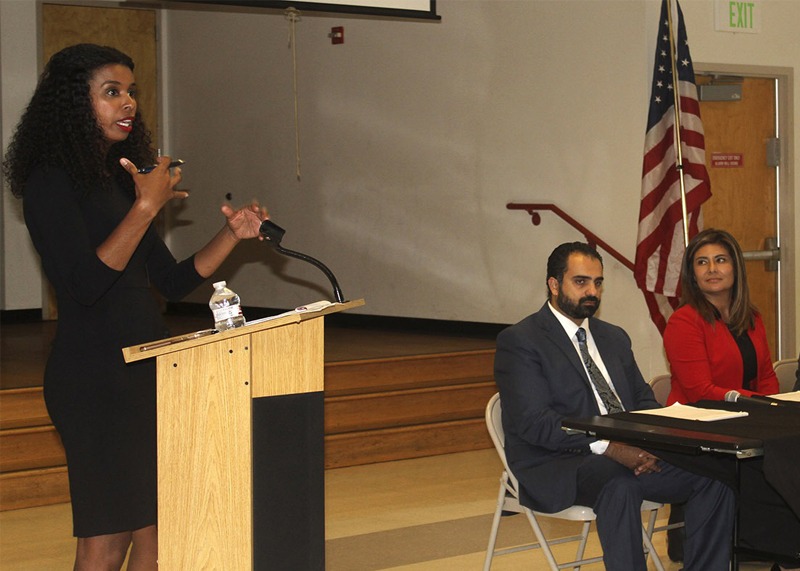21 Aug Know your rights more complicated than it appears

 How do you navigate the delicate and often frightening process from the initial police stop to the point when you unfortunately find yourself in court?
How do you navigate the delicate and often frightening process from the initial police stop to the point when you unfortunately find yourself in court?
During LA County Public Defender’s first Open House held Aug. 10, Dep. Public Defender Alisa Blair gave the community a reality check. When she has cases in which the only alleged crime is resisting arrest, she knows that often her client was simply trying assert his or her rights.
“The assumption is that you should have done something where an arrest was warranted and then you resisted it,” she said. “But a lot of times it’s just because you’re asserting your rights. So it does break my heart to say these are your rights but don’t say anything. Be quiet don’t assert them. But the reality is you want to come home.”
Blair spoke during the “Know Your Rights” panel along with attorneys Nima Farhadi, Ivonne de la Cruz, Jacques “James” Neptune and Alisa Blair during the discussion at the Rita Walters Learning Complex near Inglewood.
Know your rights extends to your relationship with your attorney, panelists said. Since California imposes among the highest bail amounts in the nation, Blair said most arrested will remain in jail until they meet their deputy public defender.
“So you meet your lawyer and you have in your mind, ‘I have this overworked tired public defender who doesn’t care about me,’ ” Blair said. “So the first thing to say is, ‘Excuse me you’re talking too fast.’ That is your right. It is our job to make sure that you understand what is going on.”
Blair told people that plea deals are their decision, not the lawyer’s. 
“There are several rights depending on your charges, depending on whether you’re going to trial or trying to get the best deal, but the number one right once you’ve been charged is your right to speak up with your lawyer. Your lawyer is your representative. Not the person who helps you get railroaded.”
In a three-part panel discussion, Public Defender attorneys, paralegals, investigators, social workers and clerical staff gave community members an inside look at defense work.
Moderated by Dep. Public Defender Tiffiny Blacknell, the discussions ranged from the initial stop by police to working with the defense team to legal services available after a sentence is completed.
The first in a series, the next Open House panel discussion will take place from 6 p.m. to 8 p.m., Sept. 28 at the Lancaster Library, 601 W. Lancaster Blvd., Lancaster, Calif.
On Aug. 10, Dep. Public Defender Nima Farhadi told the crowd that the first thing to do when stopped by police is remain calm. He and others advised people to invoke their right to remain silent.
“Even if you are absolutely innocent the worst thing you can do is overreact, giving the police cause to do something,” Farhadi said. “After you’re approached [outside a car], the first thing you should ask is, ‘Officer am I free to leave?’ If you get that question answered ‘yes,’ you should slowly walk away. Don’t run, but slowly walk away calmly. If the officer says ‘no,’ at that point, whether right or wrong, you’re being detained.”
 If you are walking and an officer asks for your identification or name, you may decline to furnish this information in the state of California, he said. If you are a female and a male officer wants to search your body, you may request a female officer to pat you down, he told the audience.
If you are walking and an officer asks for your identification or name, you may decline to furnish this information in the state of California, he said. If you are a female and a male officer wants to search your body, you may request a female officer to pat you down, he told the audience.
The “Inside a Client’s Case” panel included attorneys Eric Duvernay and Christine Rodriguez; mental health social worker manager Tracie Jones, and investigator Carolyn Gray. The “Breaking Barriers” panel included attorney Haaris Syed and Nicole Rommero; paralegals Miriam Singer and Frank Gonzales, and legal office support assistant (LOSA) Sabrina Quarles.
At a resource table, Supervising LOSA Kevin Shaw and LOSA Emily Andrade assisted residents who had questions about Public Defender services. Main organizers were Assistant Public Defender Candis Glover and Administrative Analyst Dominique Lawson-Maston. Public Information Officer Pamela Johnson also assisted.
After the panels, several people from the audience of about 30 asked questions about Prop 47, expungement and other services.
“We are committed to creating and maintaining a partnership with the community,” Blacknell said. “Our office has served the community for over 100 years. We believe it’s time that the community knew and understood the ways in which we are able to serve them.”
Photo captions from top:
1) Standing: Moderator Tiffiny Blacknell. Sitting from left: Nima Farhadi, Yvonne de la Cruz, Jacques “James” Neptune and Alisa Blair.
2) Attorney Alisa Blair speaks at panel discussion.
3) From left: Christine Rodriguez, Eric Duvernay, Carolyn Gray and Tracie Jones.

